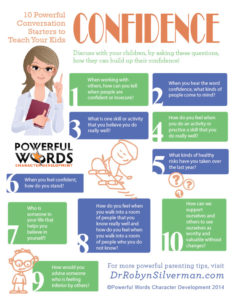 Do you want your children to learn how to be confident but you aren’t sure how to start the conversation? The Powerful Word of the Month for June is Confidence! Confidence us a combination of trust, conviction and assuredness. Confident people are aware of their strengths (but don’t brag about them) and they also know their weaknesses and what they need to work on (but don’t shame themselves). They have a feeling of inner certainty and overall, believe in themselves.
Do you want your children to learn how to be confident but you aren’t sure how to start the conversation? The Powerful Word of the Month for June is Confidence! Confidence us a combination of trust, conviction and assuredness. Confident people are aware of their strengths (but don’t brag about them) and they also know their weaknesses and what they need to work on (but don’t shame themselves). They have a feeling of inner certainty and overall, believe in themselves.
Gather your kids around the dinner table, talk to them in the car, chat on a walk or snuggle in to discuss before bed– there is no perfect time so anytime will do! The key? To have the conversations. Yes, just have them. Our children want to hear what we have to say and want the opportunity to tell you what they think! The more we talk to kids about their lives and what they believe, the more likely they are to share.
Even kids who try new things and walk into a room with an air of confidence can feel nervous, worried, scared or shy at times. These skills are for everyone.
Ask questions like; where and when do you feel the most confident and sure of yourself? What advice would you have for a friend who wasn’t feeling confident? What are some ways you can show that you are confident? Of course, share your own feelings and stories as well. Kids love hearing how we have overcome feelings of insecurity– stories can inspire, explain and give everyone a feeling that what they are going through is normal!
Enjoy these 10 powerful conversation starters- and let me know how they go! Feel free to share!
Warm regards,

PS The podcast episode released this week is about courage- a cousin of confidence- so listen in to How to Talk to Kids about Being Brave with expert guest and best-selling author, Margie Warrell!

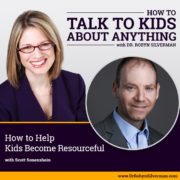
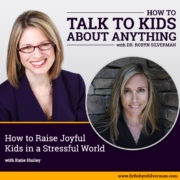
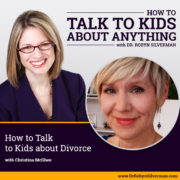



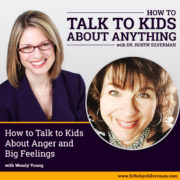
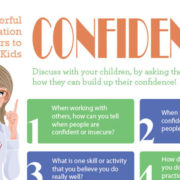
 Do you want your children to learn how to be confident but you aren’t sure how to start the conversation? The Powerful Word of the Month for June is Confidence! Confidence us a combination of trust, conviction and assuredness. Confident people are aware of their strengths (but don’t brag about them) and they also know their weaknesses and what they need to work on (but don’t shame themselves). They have a feeling of inner certainty and overall, believe in themselves.
Do you want your children to learn how to be confident but you aren’t sure how to start the conversation? The Powerful Word of the Month for June is Confidence! Confidence us a combination of trust, conviction and assuredness. Confident people are aware of their strengths (but don’t brag about them) and they also know their weaknesses and what they need to work on (but don’t shame themselves). They have a feeling of inner certainty and overall, believe in themselves.